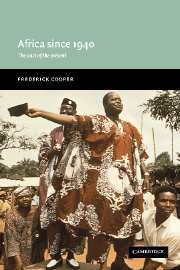Book contents
- Frontmatter
- Contents
- List of plates
- List of figures
- List of maps
- List of tables
- Preface
- Map 1 Africa: countries and cities, c. 2000
- 1 Introduction: from colonies to Third World
- 2 Workers, peasants, and the crisis of colonialism
- 3 Citizenship, self-government, and development: the possibilities of the post-war moment
- 4 Ending empire and imagining the future
- Interlude: rhythms of change in the post-war world
- 5 Development and disappointment: social and economic change in an unequal world, 1945–2000
- 6 The late decolonizations: southern Africa 1975, 1979, 1994
- 7 The recurrent crises of the gatekeeper state
- 8 Africa at the century's turn: South Africa, Rwanda, and beyond
- Index
- References
2 - Workers, peasants, and the crisis of colonialism
- Frontmatter
- Contents
- List of plates
- List of figures
- List of maps
- List of tables
- Preface
- Map 1 Africa: countries and cities, c. 2000
- 1 Introduction: from colonies to Third World
- 2 Workers, peasants, and the crisis of colonialism
- 3 Citizenship, self-government, and development: the possibilities of the post-war moment
- 4 Ending empire and imagining the future
- Interlude: rhythms of change in the post-war world
- 5 Development and disappointment: social and economic change in an unequal world, 1945–2000
- 6 The late decolonizations: southern Africa 1975, 1979, 1994
- 7 The recurrent crises of the gatekeeper state
- 8 Africa at the century's turn: South Africa, Rwanda, and beyond
- Index
- References
Summary
In the late 1930s and 1940s, colonial rule choked on the narrowness of the pathways it had created. Trying to confine Africans to tribal cages, seeking to extract from them what export products and labor it could without treating them as “workers,” “farmers,” “townsmen,” or “citizens,” colonial regimes discovered that Africans would not stay in the limited roles assigned to them. Instead, the constriction created the very sort of danger administrators feared. Urban unrest within a very rural continent challenged colonial governments; a small number of wage workers threatened colonial economies; a tiny educated elite undercut the ideological pretenses of colonialism; supposed “pagans” worshiping local gods and ancestors produced Christian and Muslim religious movements of wide scope and uncertain political significance; and commercial farmers – in a continent of “subsistence” producers – made demands for a political voice for themselves and opportunities for their children that colonial systems could not meet.
These problems came together in the years after World War II, a war which had exposed the hypocrisy of colonizing ideologies and the weakness underlying the apparent power of colonizing regimes. The conjuncture of diverse forms of African mobilization and the loss of imperial self-confidence produced a crisis in colonial policy and colonial thinking, a crisis that would lead governments, in something of a panic, to swing the pendulum toward an obtrusively reformist conception of their own role. But from the vantage point of the 1940s, it was not clear where all this ferment would end.
- Type
- Chapter
- Information
- Africa since 1940The Past of the Present, pp. 20 - 37Publisher: Cambridge University PressPrint publication year: 2002
References
- 1
- Cited by

